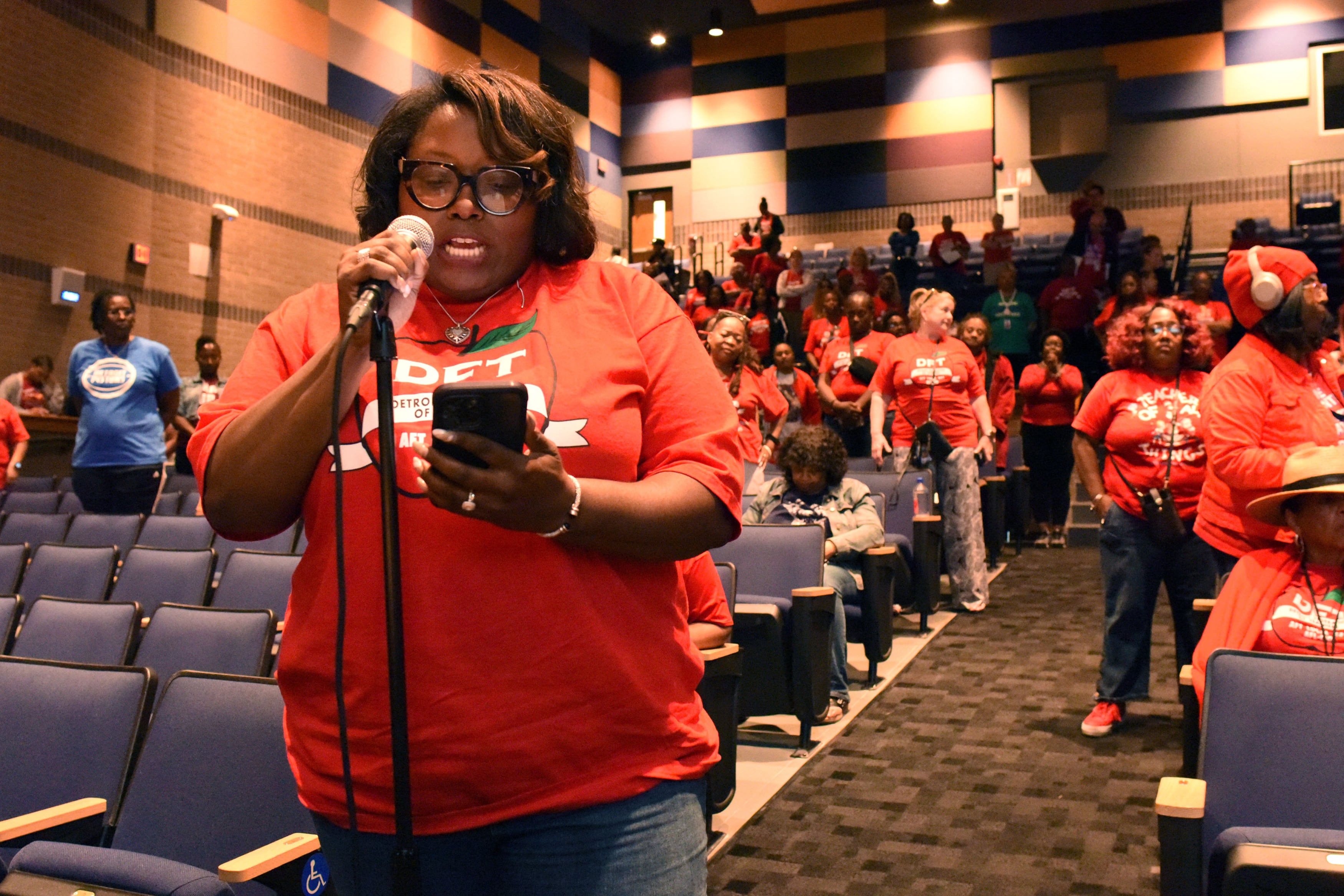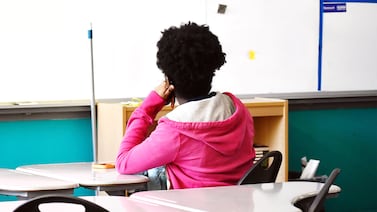Sign up for Chalkbeat Detroit’s free daily newsletter to keep up with the city’s public school system and Michigan education policy.
A historic moment seems near for Detroit school leaders and members of the teachers union, with the school district poised to approve teacher contracts before the start of a new school year. That has happened only once before — in the mid 1990s.
Those were among the remarks that Superintendent Nikolai Vitti gave this week to an auditorium full of applauding teachers, many donning bright red shirts with the Detroit Federation of Teachers logo. It was a uniquely harmonious moment for a Detroit school board meeting that was later contrasted by teacher concerns and heated comments.
Dozens of educators, school staff, and families from the Detroit Public Schools Community District had shown up to the district’s monthly school board meeting on Tuesday to push for their union contract’s approval by June 21.
While many educators were enthused about the cadence and content of ongoing teacher contract negotiations, they also used the meeting to highlight several grievances that have united them. These teacher-focused topics led to some important questions about the school district’s direction.
New era for contract negotiations between Detroit teacher union, district
This unique moment reflects a broader cultural shift for Michigan education, said union president Lakia Wilson-Lumpkins, who pointed to the Democratically-controlled statehouse, Gov. Gretchen Whitmer’s leadership, and the growing achievements of Detroit students as some factors at play.
Wilson-Lumpkins has been at the negotiating table since 2019 and this year also marked a first in her book. During a recent school board meeting, she publicly invited Vitti to attend a bargaining session. He showed up.
“And let me tell you, it worked,” she said. “We were able to make some decisions that didn’t need an ‘Oh, wait, let me see.’”
Vitti, for his part, has attended negotiations before, he said, including when he first began his seven-year tenure and during the COVID pandemic.
However, some sticking points remain. They include several of the teacher bargaining rights that the Michigan Legislature restored last year, Wilson-Lumpkins told Chalkbeat.
The new law allows teachers to once again negotiate items that Republicans in the statehouse took off the table more than a decade ago, such as seniority and transfers, evaluations, layoffs and recalls, discipline and termination, and payroll-deducted union dues.
The previous loss of these bargaining rights turned some teachers away from the field, Wilson-Lumpkins said. Now, with these terms back on the table, she said this contract could present an opportunity to entice some of those educators to return.
The union is also urging higher pay for experienced teachers.
“For our teachers who have been here over 10 years, and those who plan to stay more than 10 years, that is where our salary is not as competitive as our neighboring districts,” she said.
In 2020, Vitti approved a condensed teacher salary range that gave starting teachers some of the highest pay in the state. That meant a new teacher in DPSCD this school year with a bachelor’s degree made $51,071. But Wilson-Lumpkins said a condensed salary range does not leave as much room for more experienced teachers to receive higher pay as they accrue more years on the job.
At Tuesday’s school board meeting, Wilson-Lumpkins rallied her colleagues around these issues during the public comment period. She reminded everyone that things “are close, but not close enough.”
Teachers such as Bianca Gonzalez, a fourth year English language arts teacher at Amelia Earhart Elementary-Middle School, wants higher pay for educators, too.
“I believe that the inability to retain teachers in this district is because teachers are not being appropriately compensated for their work,” she said. The workload for teachers in DPSCD is something she said she was not prepared to handle.
Gonzalez did her student teaching in Dearborn Public Schools, and said she immediately felt “ill-equipped” to handle her workload as a DPSCD teacher.
“The responsibilities placed on teachers in this district far surpass what I expected based on my internship,” she said.
Teachers, she said, are increasingly faced with “oversized classes” that include more students who are learning English and have special needs, students with mental illness, students with behavior disorders, and students whose poor attendance affects their ability to learn.
Gonzalez’s concerns hit on a broader issue about stagnating pay for Michigan teachers, especially in a district that does not receive equitable funding per student in comparison to other Michigan districts.
Oversized classes are also a problem the district is actively trying to address with its plan to spend money from the so-called literacy lawsuit. The district approved a three-year plan to spend that money during the same meeting. One priority is hiring more K-4 teachers to help shrink class sizes, and recruit more academic interventionists to support those teachers and their students.
How do you measure the culture, climate, and morale in Detroit public schools?
Much of Tuesday’s meeting included concerns from red-clad teachers about Thirkell Elementary School principal Stephanie Gaines. The elementary school principal was recently suspended for 30 days following an internal investigation. The investigation stemmed from accusations that she created an abusive and retaliatory atmosphere.
Vitti said many of those allegations were unfounded and that Gaines was ultimately suspended for breaking district procedures and protocols, such as failing to report to the district when a student brought a Taser to school and then returning the Taser to the student.
Teachers in the audience yelled and booed when Vitti said Gaines would be returning to her post later this summer. They want to see the district take further action against the principal.
“Not only have the staff members signed a letter of no confidence, but I now have parents that have signed a petition letter of no confidence that you do not bring Principal Gains back into Thirkell Elementary School,” said Mitzi Davis, a second grade teacher at Thirkell.
The teachers who expressed concerns about Gaines led the board into some lengthy dialogue about policies and procedures.
For her part, board member Sherry Gay-Dagnogo wants to see the district implement a more consistent, systematic approach to its investigations.
“So if we have a rubric that defines things more closely, then it’s not like you’re picking a personality or a person you like,” Gay-Dagnogo said. “It’s clear what the guidelines are when you are suspended.”
She also suggested that a third party should perform an additional investigation into the allegations against Gaines.
Some educators at the meeting said these concerns are tied to the district’s climate and culture, something Vitti has been focused on improving during his tenure. He said enacting metrics for that, too, is a worthwhile exercise.
He pointed to surveys the district is using and wondered if they were the right method. He said whatever way in which they agree to define climate, culture, and morale, there should be a way to consistently measure these elements.
Some of the teachers at the meeting said one of the steps among many in improving climate, culture, and morale is to approve the union contract quickly so teachers can begin their summers with a little less anxiety.
“Having this solidified before the expiration sends a huge message to our teachers that our work is critical,” Wilson-Lumpkins later told Chalkbeat, “not just here in Detroit, but to anyone who is interested in the job.”
Robyn Vincent is a reporter for Chalkbeat Detroit, covering Detroit schools and Michigan education policy. You can reach her at rvincent@chalkbeat.org







